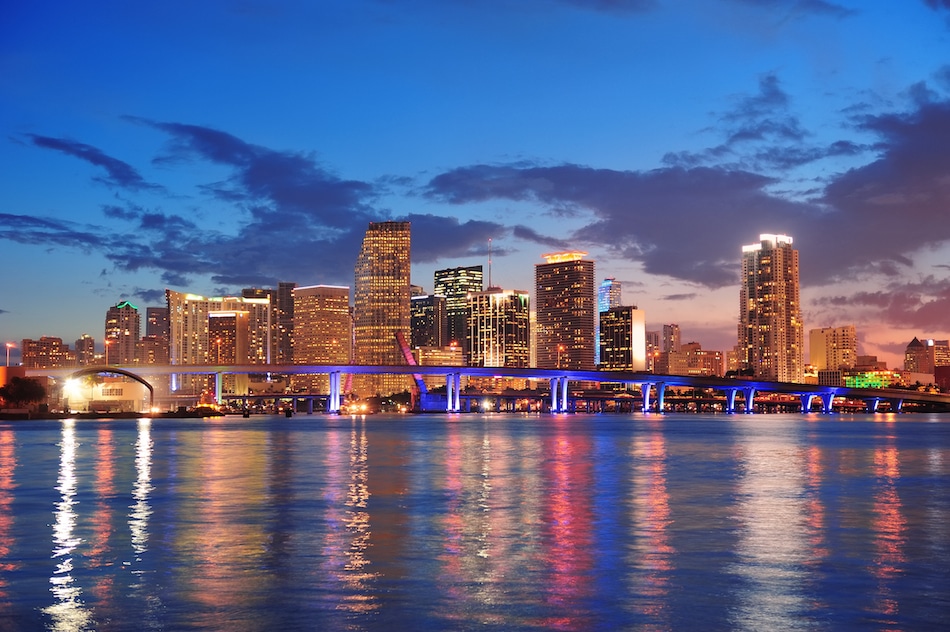Takeaways From Wonderland Miami 2022: The Future of Psychedelics
The Wonderland Miami 2022 conference brought together key figures in the psychedelics industry to discuss the evolving landscape of psychedelic research, legislation, and investment. Attendees engaged in meaningful conversations about the future of psychedelics, highlighting the need for collaboration, education, and effective advocacy to navigate the complexities of legal and regulatory frameworks.

A sun-soaked Miami welcomed thought leaders from the world of psychedelics, from founders and investors to practitioners and researchers. Wonderland, a three-day psychedelics conference, provided the time and space for the psychedelics community to engage with one another and present visionary ideas to transform how we approach the age-old drug. We were fortunate enough to participate in this event — see our pic below! — and this post outlines our takeaways from it.
-

AlphaRoot at Wonderland Miami 2022: Eric Schneider (Managing Director) and Hunter Baldwin (Advisor)
Global Regulatory Approaches
Wonderland Miami 2022 featured new speakers from Microdose Psychedelic Insights. Here are some nuggets from these presentations:
- Federally Illegal: Although psychedelics remain illegal on the federal level, states are slowly establishing programs. For example, some states have launched pilot programs for research and where they hope to be in the future. In fact, psychedelics are following in the footsteps of cannabis, mirroring its current status.
- Oregon Legislation: Oregon is introducing a bill that allows counties to opt-out of their state psilocybin program. However, we still have a long way to go to win the court of public opinion.
- Collective Effort: For-profit companies must collaborate to engage the government and enact change. Additionally, we must unify collectively on an approach to advocate at the federal level.
- Ongoing Training: There is a significant need for training for everyone involved within the space. Initiatives exist now, but they need to broaden.
- Hindered Research: The Schedule 1 status hinders psychedelic research, creating massive setbacks for the industry.
Through the Pharmaceutical Lens
Christopher Moreau, CEO of Algernon Pharmaceuticals, shares insights from his unique perspective:
- Clinical Trials: Pre-clinical trials have a 90% failure rate; however, Phase One on healthy humans comes in with a failure rate of 34%. Of the ideal population to treat, Phase Two has a 51% failure rate. Phase Three shuffles in with a failure rate of 41%.
- Brain Healing: Dimethyltryptamine (DMT) products are currently in Phase One trials as it’s shown to help the brain heal after an injury.
- Patents Timeframe: There is a 20-year timeline for patents. This sequence breaks down into 13 years of trial stages, with only seven years to sell and make money back. However, there is a 98% failure rate from state to finish.
- Patent Purpose: Patents focus on the method of use, dosage, and formulation (i.e., delivery method).
- DMT Impact: In trials, DMT has the most significant effect on neuron growth. Its impact on strokes is now in pre-clinical trials (in vivo).
- Actual Reports: Transient MCO was applied to male Wistar rates in a post-stroke recovery study. Also, researchers are studying DMT and its anxiolytic and antidepressant effects.
Psychedelics Capital 2022
Jan Hardorp, Partner and Co-Founder of re.Mind Capital, highlighted several nuances in psychedelics investing. Investors are choosing wisely due to the lack of capital, and many prefer to invest in private companies where they can get in early. Here’s the twist; people are buying more vices in a down market, making the industry somewhat price-inelastic. Here are some other psychedelics investment insights from this panel:
- re.Mind Capital deployed 40% of its $130M, which includes 23 portfolio companies.
- Finding the right receptor in the brain that is therapeutic is the key. Some research suggests the main 5ht2a receptor may not be the therapeutic one.
- FDA approving these products would benefit companies securing affordable insurance for their operations.
- The sun has set on the days of fast raises and IPOs, but there are always cycles, so don’t rule out hyper-demand coming back.
Lastly, each panelist listed a “breakout” company in which they’ve invested, including Perception Neuroscience, Neurocare, and Cudovia.
Psychedelics Legalization
Various Wonderland panelists discussed the concept of legalization, concluding several insights. For starters, many US cities are establishing incentives to decriminalize psychedelics, and some states are promoting regulated models. For example, Colorado voters recently approved legalizing psychedelics, nearly a decade after the state legalized cannabis.
However, the two paths differ because cannabis didn’t have FDA approval, while psychedelics will likely have one in the pipeline. Let’s learn from past mistakes, such as some states’ over-excitement in cannabis and failure to work with the federal government.
Instead, we must frame discussions differently, using compelling stories to help Congress better understand psychedelics. Veteran advocacy has been tremendous, successfully pulling on the heartstrings of Congress members.
Finding Balance in Psychedelics Regulation
We in the industry often become impatient about the federal status as state vs. federal battles unfold — but we must be patient. Although state legislation might seem onesie-twosie, the more movement on this level (and in clinical trials), the more likely federal legalization becomes a reality. Here’s
- Risk Management: We must learn more about protecting health practitioners and keeping patients safe.
- Clinical Trials: Psilocybin is currently in clinical trials with FDA approval pending. Without the FDA’s stamp of approval, any schedule shifts at the federal level will be challenging.
- Psychedelics Training: We must establish unified training methods like Oregon’s. For example, you need a high school education and 120 hours of training to give people mind-altering drugs in Oregon.
- Competition: For-profit organizations advocating for specific compounds that affect their business must learn to avoid sabotaging other companies or compounds.
- Research Barriers: We must work together to remove barriers to research, such as the Schedule One status, which hinders cannabis. However, access and timing are critical, not to mention support from DEO and FDA.
- Creative Regulatory Details: Moving too quickly is a significant fear—the details matter, such as variations in dosage depending on the type of products.
- Balanced Regulations: A challenge is creating too stringent regulations regarding practitioner qualifications to administer psychedelics therapy. Yet, we must make strict enough rules to develop patient safety.
It was great to learn from industry leaders and thought leaders around the psychedelic community. Looking forward to the next one!
Protecting your psychedelics company can seem confusing; however, we’re a full-service insurance brokerage working with carriers worldwide to offer you the best coverage possible. We’re here to help! Please reach out to us today by emailing info@alpharoot.com or calling 646-854-1093 for a customized letter of commitment or learning more about your cannabis insurance options.





